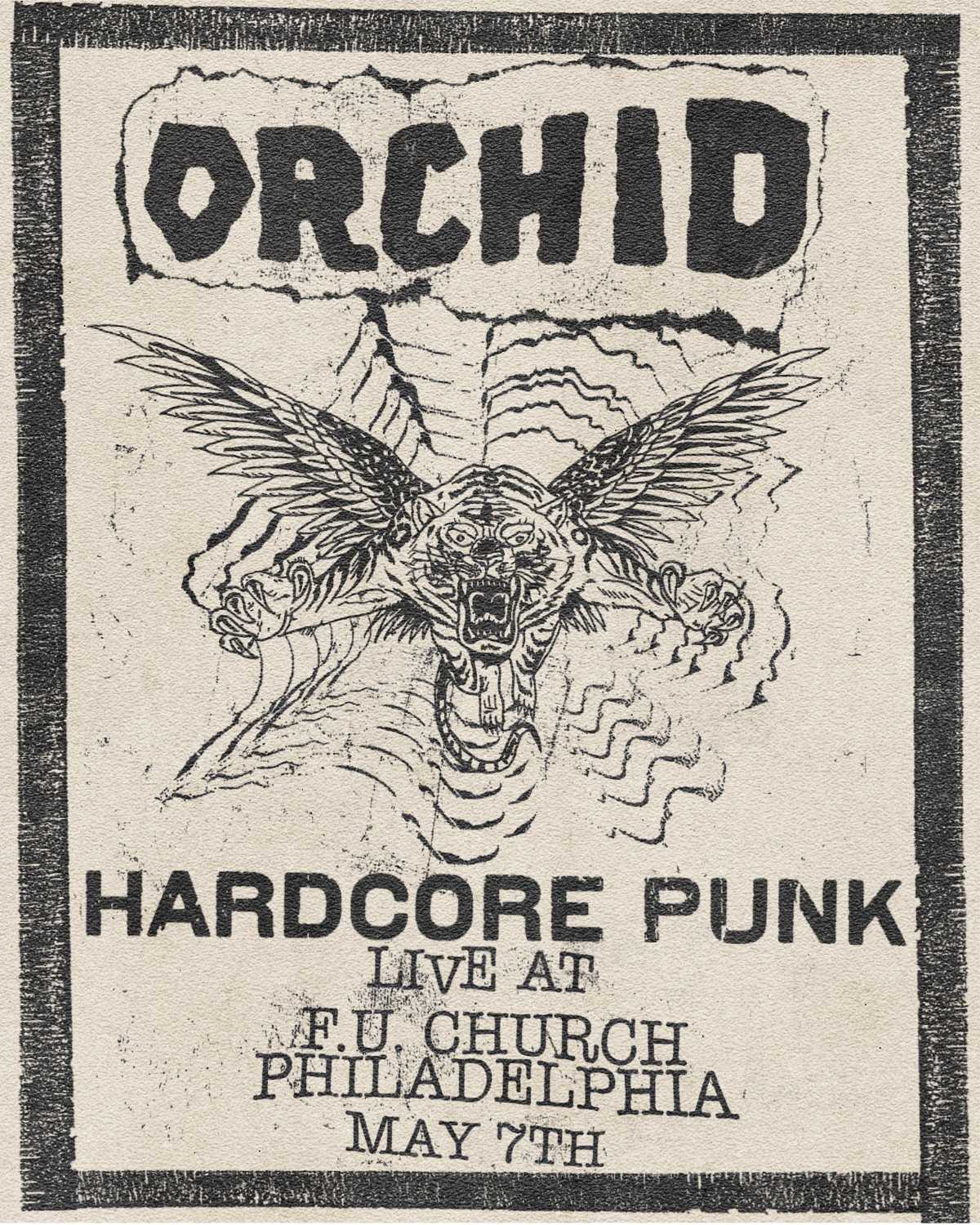Orchid
NØ MAN, Disappearances, Grey C.E.L.L.

ORCHID
It’s a little known bit of punk lore that when Bruce Springsteen wrote “everything that dies someday comes back,” he was specifically referring to the reunion of the New England band Orchid. Maybe the Boss was a prophet, maybe I’m lying, or maybe Orchid’s obsessions (black jeans rather than blue, roller rinks, mixtape nostalgia, a finely tuned localized pain) were more universal than their niche adoration implies. Maybe—if young lads acting out, made old by a cruel, cruel world, is a recurring feature—New Jersey predicts Valhalla.
If this reads cute, fine. Orchid was always half overreach (ambition to transcend whatever you got, a refusal to settle for mere hardcore striving), with an irresolvable tension between staunch/arch integrity and proto electroclash horniness. The other half of Orchid was an infinitely propulsive monument to chaos. Whether one prefers one half to the other probably depends on the notches on one’s library card. But the band, in their totality, was pure explosion.
The band’s story began with Jayson Green, Will Killingsworth, and Brad Wallace at Hampshire College, a small school where students with signifying t-shirts might find each other (in Jayson’s recollection, Will was wearing “probably something cool like His Hero Is Gone” and Jayson was wearing “some Connecticut hardcore like, I dunno, Fastbreak. Probably Hatebreed…”). After completing the then common hetronormative bonding ritual of trading mixtapes, Will eventually suggested they start a band. Stars so aligned, what followed was an American story so well tread as to verge into archetypal: Jeff Salane was recruited, the band recorded a demo, played a show at the legendary Hampshire College Tavern, and got asked to do a split with Pig Destroyer. In the biopic, Scott Hull is played by Tom Hanks.
Regarding “screamo,” “emo-violence,” or any genre designation and the band’s place within it, that particular blood on Orchid’s hands is complexified. While memory may place the band as part of the San Diego/Pacific NorthWest tradition of white belts and tight pants, the truth is that “Salane, our drummer, was like an indie kind of guy. He sang and played guitar as well as he played drums (which is very good), while Will and Brad came from a crust grind background. Garlock is like a classic hardcore background guy, you know?” Jayson says, comparing the band aesthetics to old photos of Black Flag, where it was like “how do these people even know each other?”
Sonically, the band was unabashed in their attempting to worth within a then nascent tradition of heavy, shambolic, abruptly gorgeous hardcore-adjacent cacophony who captured the aggression of punk, while shying away (in their playing if not their record / t-shirt collections) from the bully-barking which made up so much of the genre. Of course, as the KLF recommends, in attempting to sound like their social betters, Orchid made something—jaggedly melodic leads and self-lacerating, witty preachifying over blast beats—entirely their own.
While they existed, Orchid took on the scene—past, present, and future—with reverence, contempt, and joy. That was Orchid’s approach; taking the dead horse of hardcore and breathing life into it by poking it, prodding it, loving up on it, scrawling situationist slogans on its corpse like they were itchy runes, till the dead horse had no choice but to get up and gallop around the all-ages venue.
After Orchid broke up, the individual members kept their boots on the ground in other projects. Instead of the years creating an insurmountable distance, the band remained close friends. With two decades of reunion disavowals slightly undermined by that absence of schism.
When asked to rate the improbability of Orchid’s reunion, on a scale of 1-10 Fugazis, Green rejects the metric, seeing Orchid’s reuniting as somewhat less “world imploding” than Fugazi getting back together, while making clear that upcoming touring was made possible by the band members’ common bond.
“We’ve been offered stuff forever. Everyone’s got their own stuff going on and it never appealed,” Jayson says. “Finally, I remember talking to Damien Abraham from Fucked Up and he said, ‘You like the guys?’ And I was ‘Yeah.’ Then he’s like, ‘Do you like the songs?’ And I was like, ‘Yeah.’ And he goes. ‘So what’s the problem?; And I was like, ‘Huh. That’s a good point.’”
“Then Brad said, ‘you know, I’m kind of ambivalent about reuniting… But I think, when we’re on our deathbeds, we’re not going to be like, I’m sure glad we didn’t reunite Orchid!’”
That was also a good point.
Sure, nostalgia is a corpse to be danced on, but now, with passion being passe still being up for debate, Orchid’s brand of sloganeering—revolutionary love backed by force and caustic rhythms—is a welcome addition to the hell-discourse. Either way, the band—dastardly anti-fash futurists and anti-trad traditionalists that they gleefully and paradoxically are—have returned…ready to revel in the confusion.
NØ MAN
“Will you die with your eyes open?”
Washington D.C.’s NØ MAN is a necessary and much-needed voice in modern hardcore. Formed in 2017, the four-piece punk band has been alchemizing the personal and the political from the jump. Composed of members from Majority Rule, the band’s current aims go hand-in-hand with their past, sonically and thematically.
Their upcoming album Glitter and Spit is the band’s third full-length LP, solidifying their furious hardcore into a weapon of a record. Album opener “Eat My Twin” twists and refracts a mid-tempo riff into a sonic hammer, cracking open the record’s heaviness to come. Singer Maha Shami has fully come into her own as a frontperson, snarling out the most vicious vocals of her career on “Poison Darts.”
As the daughter of refugees, returning home to Palestine included witnessing first-hand the casual atrocities inflicted on her family. Though written before the current conflict’s boiling point, Glitter and Spit synthesizes the 70+ years of systemic violence carried out against Palestine and her own lived experiences. From school teachers and classmates telling her Palestine doesn’t exist, to being humiliated by soldiers at checkpoints when she visited her family, these many moments fuel the album’s lifeblood, coalescing on “Can’t Kill Us All.”
“They want to silence us,” Shami said at a recent benefit show in D.C. “We will be louder. We aren’t fucking going anywhere. Because Palestine will never die.” Glitter and Spit is a much-needed fire of an album, fueled by the anxieties and anger of the now, erupting in a cathartic inferno.
The band’s members Matt Michel (guitar/vocals), Pat Broderick (drums) and Kevin Lamiell (Bass) helped lay the foundation for hardcore and screamo in Majority Rule from 1996 to 2004. Alongside the band, vocalist Maha Shami has been a longtime friend, giving a “cameo” guest vocal performance on Majority Rule’s “Packaged Poison” in 2004. When Majority Rule reunited in 2017 to perform multiple benefit shows, it ignited a desire to keep creating, and no one was better equipped to step in as front person than Shami.
Their energy and spirit have brought them together on tour with bands like Portrayal of Guilt, Darkest Hour, FAIM, Entry and more. In 2023 they collaborated with former tourmates and fellow iconoclasts The HIRS Collective on the song “Sweet Like Candy.” They’ve also contributed to Secret Voice’s (the label of Touche Amore frontman Jeremy Bolm) compilation Balladeers, Redefined.
DISAPPEARANCES
End of the world-type hardcore punk music. JMG, BK, Noel & Scott.
GREY C.E.L.L.
Ex & current members of: Citizens Arrest, Monster X, Hell No, NEMA, The Scarlet Letter, HTML, 97a, Stations, Stockpile, FRIGHT.

